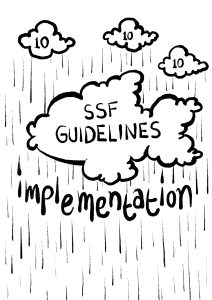A wide range of actors—ranging from civil society organizations to grassroots activists and trade unionists—are rallying around a human rights-based approach to tackle issues plaguing the small-scale fisheries subsector
It was on 10 June 2014—a little over a decade ago—that the Thirty-first Session of the FAO Committee on Fisheries (COFI) formally endorsed the SSF Guidelines. COFI also recognized the critical role of the “adopted SSF Guidelines” in improving the social, economic and cultural status of small-scale fisheries vulnerable to disasters and climate change, and reiterated the human rights-based approach. Also on the same day, COFI welcomed the global assistance programme launched by FAO to support the implementation of the SSF Guidelines. COFI thus helped germinate seeds sown during the International Conference of Fishworkers and their Supporters in Rome in July 1984 (See the article, Rallying for Collectivism, page 4).
 It is just incredible that COFI saw the relevance of a human rights-based approach in the context of small-scale fisheries to meet its obligations arising out of Rule XXX of FAO. Ten years down the line, there is so much water under the bridge. The SSF Guidelines have triggered many processes, worldwide. There are several national plans of action for small-scale fisheries that have been developed in Africa and Asia (see the article, Leaving No One Behind, page 11).
It is just incredible that COFI saw the relevance of a human rights-based approach in the context of small-scale fisheries to meet its obligations arising out of Rule XXX of FAO. Ten years down the line, there is so much water under the bridge. The SSF Guidelines have triggered many processes, worldwide. There are several national plans of action for small-scale fisheries that have been developed in Africa and Asia (see the article, Leaving No One Behind, page 11).
Many countries are drawing elements from the SSF Guidelines to develop their own national legislation (See the article, A Robust Platform, page 88). The characterization matrix developed by the Illuminating Hidden Harvests report of the FAO, Duke University and WorldFish is now being used in different contexts to develop acceptable definitions of small-scale fishing. Artisanal fishers of Africa are drawing inspiration to uphold decent work and are seeking wider ratification of the C188 Work in Fishing Convention, 2007 (See the article, Tooling Up, page 55).
Civil society mechanisms like International Planning Committee for Food Sovereignty (IPC), and organizations like World Forum of Fisher Peoples (WFFP), World Forum of Fish Harvesters & Fish Workers (WFF), African Confederation of Professional Organizations of Artisanal Fisheries (CAOPA), Platform for African Women Network of Fish Processors and Traders (AWFISHNET) and ICSF’s own initiatives, among others, have been complementing those of FAO to implement the SSF Guidelines in several national and regional contexts. Academic initiatives such as Too Big to Ignore (TBTI) and Centre for Maritime Research (MARE) have led to
several SSF-focused events and bringing forth useful publications.
The United Nations General Assembly Declaration of the year 2022 as the International Year of Artisanal Fisheries and Aquaculture (IYAFA) and the sustainable development goals (SDGs) certainly gave a fillip to the implementation of the SSF Guidelines in different regional contexts. An enhanced awareness of the SSF Guidelines is leading to a serious engagement with elements like tenure rights, social development, social protection, climate change impacts and disaster preparedness. There are several articles in this issue of SAMUDRA Report dealing with these topics. The rise of “occupational pluralism” to deal with climate change impacts (See the article, A Portrait of Risk and Resilience, page 65) and the emergence of parametric insurance to cover disaster risks (See articles, A Formidable Arsenal, page 73 and Parametric Insurance, page 91) are significant developments for small-scale fishers.
The forthcoming SSF Summit must bring greater coherence across these civil society, NGO, academic intergovernmental and national efforts to fully realize the potential of sustainable small-scale fisheries for food security and poverty eradication in a logical manner, and to uphold the culture of traditional fishing communities and Indigenous Peoples.
The summit must become a forum for exchanging ideas, to direct different concerns and interests to relevant and competent processes and agencies, within and beyond fisheries, to realize the full potential of a human rights-based approach, towards securing lives and livelihoods of small-scale fishers and fishworkers, as well as Indigenous Peoples, caught between the negative impacts of the blue economy and climate change.